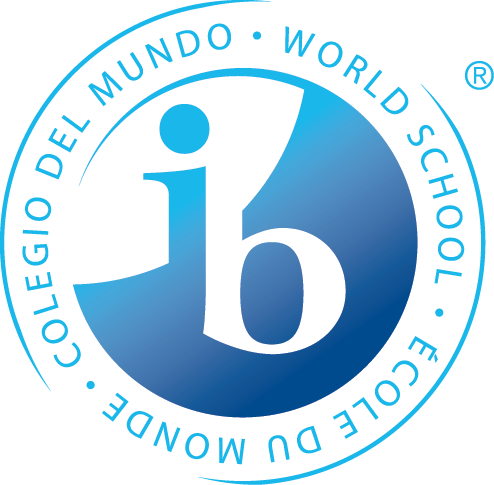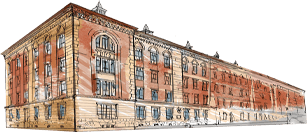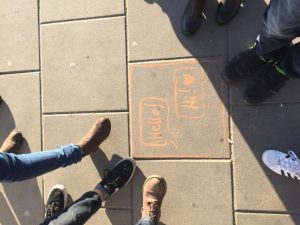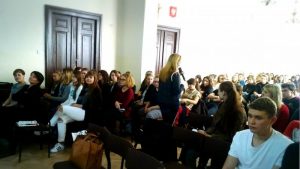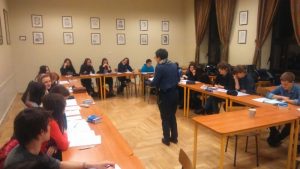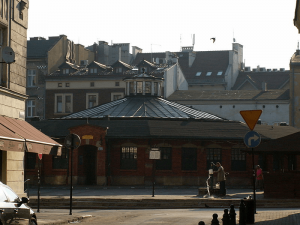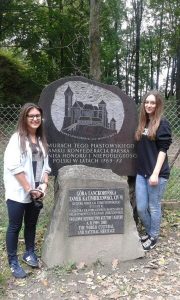Subpages:
Goals of UNESCO Associated Schools
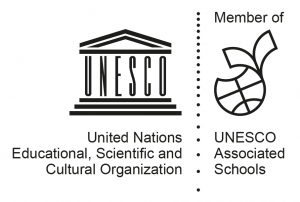 |
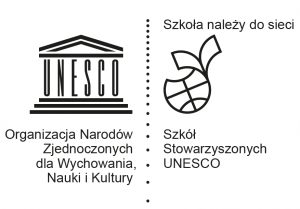 |
2016/2017 school year
TRANSLATION WORKSHOPS: TEACHING TRANSLATION IN FILM
On April 24, for the second time this school year, within the walls of Secondary School No. 6 in cooperation with the Institute of English Studies of the Jagiellonian University, workshops on the subject of translating David Attenborough into Polish were held. This time, amateur linguists, together with Dr. Agata Hołobut, discussed and practiced techniques related to translating films, in particular scripts prepared for teachers, so popular in Poland. The workshop participants surprised the organizers with their professionalism and sensational work effects. I invite you to the next meeting with translation for the next school year.
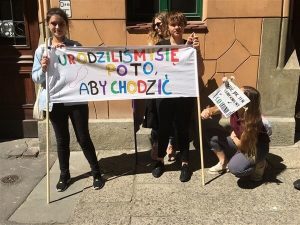 |
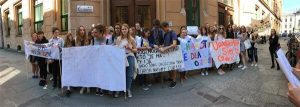 |
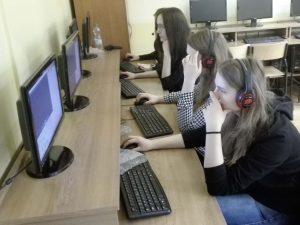 |
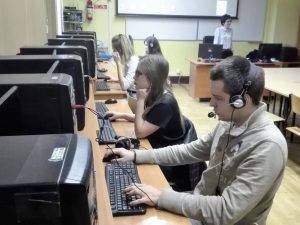 |
World Environment Day – June 2, 2017
On June 2, 2017, we celebrated the World Environment Day. Students from class 2a3 and 1i prepared a pro-ecological campaign – “I was born to walk”. The youth with prepared banners promoting a healthy, ecological lifestyle walked through the city of Krakow along the trail of nature monuments located in the immediate vicinity of the school.
INTERNATIONAL DAY OF POETRY – TRANSLATOLOGY COMPETITION
The winner of the translation competition, for faithful devotion to the spirit of T. S. Eliot’s poetry and loyalty to the Polish phrase, was
Anna Kwiatek from class 3a2.
The award for the most poetic translation was received by Kacper Dziadkowiec from class 1c.
Congratulations!
Organizers: Iwona Ryż Jakub Pstrąg
March 21 – International Day of Poetry
I am very grateful to all Polish teachers who offered some of their lessons and made it possible for young poets to create poetic reflections related to the school. A very interesting collection of poems has been created, which we will publish on the third floor of our high school. Thank you and congratulations to the students who took part in this lyrical endeavor.
Grażyna Fallowa
Here is one of the poems – author: Justyna Wielosik (IIF)
****
Something more than walls
Something more than space
Like in the subway
Scrolls
People
Their stories, experiences
One cliche
Each print is unique
Clear
Or less
A piece of history for a print
For the walls of the eye, a wink
One of many
A factory of red brick experiences
Each print is also a brick
And each building block creates an organism
Place of change
A stop on the way of life
The speeding youth of the tram
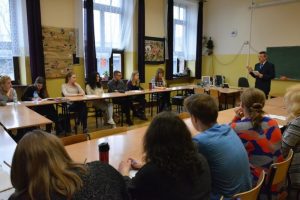 |
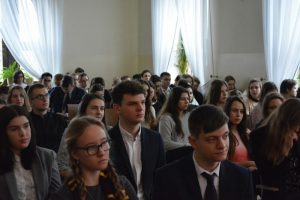 |
INTERNATIONAL DAY OF THE NATURAL LANGUAGE
IN THE VI GENERAL EDUCATIONAL Lyceum named after ADAM MICKIEWICZ
IN CRACOW
(February 21-22, 2017)
VI High School, one of the oldest high schools in Krakow, would like to celebrate this special day in a special way for the fourth time. Previous celebrations attended by eminent linguists and literary scholars
from the Jagiellonian University and the Pedagogical University:
prof. dr hab. Franciszek Ziejka, prof. dr hab. Renata Przybylska, prof. dr hab. Bogusław Dopart,
prof. dr hab. Tadeusz Budrewicz, dr hab. Kazimierz Sikora, dr hab. Mirosława Mycawka, Dr. Marta Rusek,
Dr. Małgorzata Sokalska and the excellent Krakow poet Ewa Lipska and the artist-painter Dr. Anna Kaszuba-Dębska were appreciated by teachers, youth and the Krakow media. The two-day scientific event gathered not only students of High School No. 6 and 5, but also students of junior high school in Kraków. Undoubtedly, the rank of the ceremony was enriched by the Honorary Patrons of: the President of the City of Krakow, the President of the City Council of Krakow, the Małopolska Superintendent of Education, the Dean of the Faculty of Polish Studies at the Jagiellonian University and the Literary Society of Adam Mickiewicz and media patrons (Dziennik Polski and Radio Kraków).
This year’s celebrations will be inaugurated by a scientific session on February 21, 2017, during which the papers will be delivered by:
dr hab. Mirosława Mycawka (Department of Contemporary Polish Language, Faculty of Polish Studies of the Jagiellonian University)
and Kacper Owiński, MA. Then, there will be reading lessons, during which young people will interpret selected texts of culture under the guidance of Masters – excellent literary scholars
from the Jagiellonian University: prof. dr. hab. Bogusław Dopart, dr hab. Dorota Wojda, Dr. Monika Stankiewicz-Kopeć, Dr. Anna Marchewki, Dr. Tomasz Majkowski. On the second day, the invited junior high school students will take part in literary, language, journalistic and theatrical workshops conducted by teachers of Secondary School No. 6. The ceremony will be crowned by a meeting with prof. dr hab. Jan Miodek, who at the beginning of March will honor us with his presence and give a lecture at the 6th Secondary School.
The aim of the project is to show young people a scientific view of literature and Polish language as factors enriching the world of human experiences, shaping their ideals, ethical sensitivity, imagination, feelings and thoughts. outstanding scientists and people of culture. We are deeply convinced that the celebrations, as every year, will encourage discussion about the richness of our written and spoken language and will encourage reflection on the role and place of Polish language and literature in the life of a contemporary Pole.
Honorary patronage:
Prof. dr hab. Jacek Majchrowski
Mayor of the City of Krakow
Bogusław Kośmider
Chairman of the Krakow City Council
Barbara Nowak
Małopolska Superintendent of Education
Prof. dr hab. Renata Przybylska
Dean of the Faculty of Polish Studies of the Jagiellonian University
Prof. dr hab. Bogusław Dopart
Head of the Department of the History of Enlightenment and Romanticism at the Jagiellonian University
President of the Krakow Branch of the Literary Society of Adam Mickiewicz
Magiczny Kraków Radio Kraków
 |
PROGRAM FOR THE CELEBRATION OF THE INTERNATIONAL MOTHER LANGUAGE DAY
IN THE VI GENERAL EDUCATIONAL Lyceum named after ADAM MICKIEWICZ
IN CRACOW
February 21, 2017 (Tuesday)
9.00-11.30
Greeting guests and foreword:
Czesław Wróbel, PhD, Director of the VI Liceum Ogólnokształcące im. Adam Mickiewicz in Krakow
Opening ceremony and guest speeches
inaugural lecture:
- Euphemisms in the language of politics dr hab. Mirosław Mycawek
Department of Contemporary Polish Language, Faculty of Polish Studies of the Jagiellonian University lecture:
- Hard jeers and mollusks, or why historical grammar is not as terrible as we think Kacper Owiński, MSc
Faculty of Polish Studies of the Jagiellonian University
11.30-12.00- break
12.00- 13.30- “reading lessons” (workshops for students of High School No. 6)
* Prof. dr hab. Bogusław Dopart (“Ad leones” by Norwid)
* dr hab. Dorota Wojda (Leśmian’s “Transformations”)
* dr Monika Stankiewicz- Kopeć (Napoleonic themes in “Pan Tadeusz”)
* dr Anna Marchewka (“The Maidens of the Wolf” by Iwaszkiewicz)
* dr Tomasz Majkowski (The Witcher as a transmedia phenomenon)
22 February 2017 (Wednesday, day for junior high school students)
10.00-11.00
dr Jakub Pstrąg – lecture
11.00-12.00
workshops conducted by teachers of Secondary School No. 6 in Krakow:
* Justyna Kuśnierzowska (“I know what I say and I know how I say”);
* Justyna Radoń (“Little and Big Mythological Journeys”);
* Anna Jończyk (“Poetic Futureski”);
* Michał Kozień (“The mysterious meaning of words”)
12.00 – 12.20: scenes from the play “Chrysostom of the Bulwiecia, journey to Ciemnogrod”
performed by the School Theater Proscenium, dir. Marlena Maciejewska
TRANSLATION WORKSHOPS: TRANSLATION OF POETRY
On December 12, 2016, in High School No. 6, a two-hour workshop on poetry translation was held for all those who are passionate about English and those who would like to become translators in the future. As in previous years, the classes were conducted by Dr. Agata Hołobut. The subject of the meeting was the poetry of Michael Ondaatje, who is known to Polish readers primarily as the author of the famous novel “English Patient.”
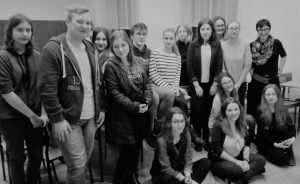
AMNESTY INTERNATIONAL LETTERING MARATHON
In connection with the upcoming World Human Rights Day, held on December 10, we are organizing the Letter Writing Marathon under the patronage of Amnesty International.
Students who would like to join the action, we would like to inform you that the mailbox is located in the school’s reading room and please contact the action coordinators, Mrs. Paulina Pacyna and Mrs. Iwona Ryż
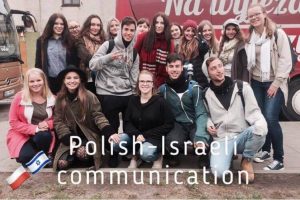
City game 2016
This fall, the second grade students of Secondary School No. 6 once again took part in the city game organized as part of the Foreign Language Day.
Divided into thirteen groups, they struggled on the streets of the Kazimierz district with tasks related to its history, culture and topography. In addition to transferring their knowledge in English, they had to demonstrate creativity, photographic, vocal, acting and even poetic skills. The aim of the game was to learn through playing together, and to better integrate student teams while working in groups.
The jury composed of: prof. Zofia Grzesik, prof. Iwona Ryż and prof. Paulina Pacyna was pleasantly surprised by the high level of work. So it decided to award the competing youth with ‘fives’ from English in three categories.
In the ‘Knowledge’ category, the interdepartmental group of prof. Artur Kowalski. The award for the ‘Best Photo’ was awarded to a group from Spanish classes led by prof. Paulina Pacyna. Whereas the ‘clip advertising Kazimierz’ recorded by the group of prof. You can see Michał Gburek on the school website.
We would like to thank all participants for their commitment and fun together.
Congratulations and we invite you to admire the most interesting works.
Coordinators,
prof. Iwona Ryż and prof. Paulina Pacyna
2015/2016 school year
ERASMUS PROJECT + 2016-2017 EDITION
CO TO JEST? Erasmus+ NITOK to projekt, który organizujemy wraz ze szkoła w Olofstrom w Szwecji. Polega on na współpracy między uczniami obu szkół podczas dwóch tygodniowych spotkań. NITOK to skrót od National Identity and Tolerance in Olofstrom and Krakow.
KIEDY? Grupa szwedzka przyjeżdża do Krakowa jesienią 2016, grupa polska jedzie do Szwecji wiosną 2017.
DLA KOGO? Dla wszystkich osób z klas pierwszych, które chcą wziąć udział w drugiej edycji programu Erasmus+
ILE JEST MIEJSC: 20
ILE TO KOSZTUJE? Projekt finansowany jest ze środków Erasmus+, uczniowie nie płaca za nocleg, wyżywienie ani podróż
JAK ZGŁOSIĆ CHĘĆ UDZIAŁU? Zgłoszenia przyjmujemy w nieprzekraczalnym terminie do 20 maja. Należy odpowiedzieć w max.100 słowach na pytanie: WHY WOULD YOU LIKE TO TAKE PART IN THE NITOK ERASMUS+ PROJECT AND HOW CAN YOU CONTRUBUTE TO IT? W formie wydrukowanej zgłoszenia wraz z imieniem+nazwiskiem+klasą należy przynosić osobiście do prof. Eastwood lub prof. Gburka. Po zebraniu wszystkich zgłoszeń komisja złożona z nauczycieli VILO zaangażowanych w projekt podejmie decyzję odnośnie wyboru uczestników.
ZAPRASZAMY!
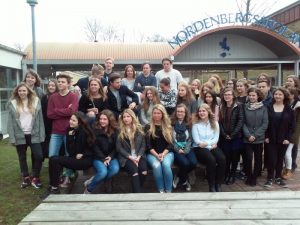 |
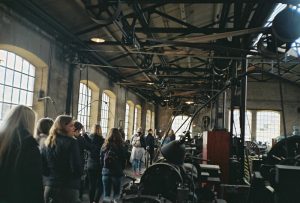 |
 |
 |
ERASMUS+ – NITOK – Szwecja – Olofstrom
In early April, twenty students went to Sweden for an exchange, where they spent 7 wonderful days admiring the beauty of Swedish nature and completing the NITOK (National Identity and Tolerance Olofstrom and Kraków) project.
Our young people had the opportunity to get to know the quiet Olofstrom, located in the southern part of Sweden, with only 13,000 inhabitants, as well as the port city of Karlskrona, which houses the Naval Museum. For the first time, students could look inside the submarine, and see the main attraction of the museum, which was an exhibition of authentic models of ships. We also visited a nearby fort to find out, for example, what the cannon service and the defense of the city from the sea looked like.
Our hosts took care of our time, so they prepared something different for us every day. We were inside the Volvo factory, an old foundry, where we could learn about the metallurgical industry in the past. Among the attractions, we were impressed by the sculpture exhibition located in the park adjacent to the Wanas manor house.
Our students could discover Swedish culture and cuisine all the time. Now we know that a dinner without sauce, extra bread and a glass of milk is not dinner. Fortunately, after such meals, we had time to regenerate and walk in the surrounding forests. On the last day, as part of the project’s completion, we had the opportunity to taste Smargostort, a sandwich cake, one of Sweden’s favorite ‘desserts’.
Thanks to the wonderful atmosphere, polite Swedes and beautiful nature, those 7 days passed much too quickly. We can safely say that we are looking forward to next year’s exchange.
At the same time, we encourage first-grade students to participate in the exchange. Another trip next year!
National Mother Tongue Day
Between 23 and 25 February our School organised, for the third time, the National Mother Tongue Day, which turned out to be extremely successful – we even got a mention in the press! The programme included lectures and workshops on the subjects related to language – the theatre, non-verbal communication, ‘reading’ works of art, and many others.

Polish-English translation workshops
December 27, 2015 Polish-English translation workshops were held in the building of Secondary School No. 6. For the third time, students interested in literary translation had the opportunity to take part in classes of this type, led by Dr. Agata Hołobut, lecturer at the Chair for UNESCO Translation and Intercultural Communication. The subject of the meeting was the poetry of Charles Simic and his two poems dealing with not very pleasant creatures: Cockroach, or Cockroach, and Dear Helen, whose theme is squirts, also commonly known as sea cucumbers. Students participating in the workshops showed great linguistic intuition and imagination, surprising both their colleagues and their tutors with their ideas and translations. Congratulations on your talent and encourage you to continue fights with literary translation. Information about the translation competition soon.
Coordinator: Iwona Ryż
|
|
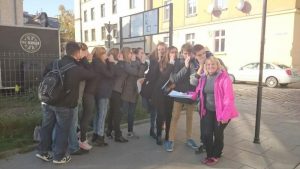 |
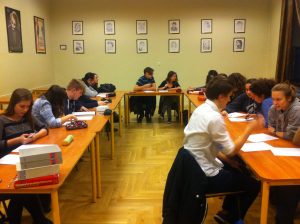 |
English-language City Game
On October 28, second grade students took part in a city game organized by English teachers in the historic district of Kazimierz. Students in teams wandered the streets of this picturesque part of Krakow, looked at the map, UNESCO monuments and discovered history and interesting facts. The winning group has not yet been selected, but congratulations to everyone for active participation in this English-speaking event!
A. Eastwood
|
|
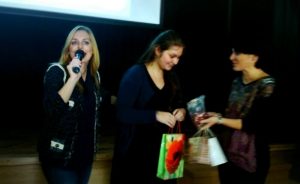 |
Columbus Day – 13/10/2015
13.10. 2015 at our school there was a lecture in Spanish devoted to the Discovery of America. The lecture was given by the teacher of Spanish literature, prof. Nayra Ramirez Peñuela, who could not miss, of course, students studying in the Spanish section of our high school. The lecture ended with a short competition in which the students could present their knowledge and receive valuable prizes.
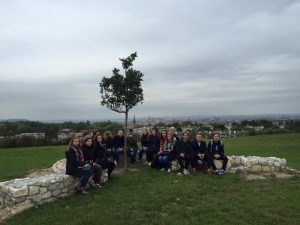 |
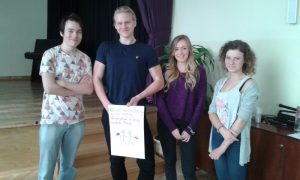 |
ERASMUS + stage one completed!
The first phase of the Erasmus + NITOK project has ended.
Polish students on Monday began active cooperation with Swedish students as part of the NITOK ERASMUS + project. We worked on the issue of identity and tolerance (posters can be admired in school display cases), we discussed topics related to our countries, we looked for similarities and differences between teenagers from both countries.
On Tuesday we went to discover the salt mine in Wieliczka, and Wednesday was a time of reflection and contemplation on the issues of intolerance, racism and the Holocaust. The whole group went on a trip to the museum in Oświęcim.
During the week we learned a lot, discussed and analyzed. There were also exceptional presentations on tolerance today and our national identity.
We are already looking forward to going to Sweden in April!
 |
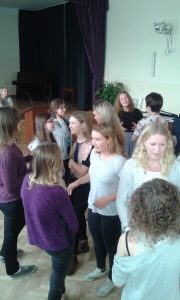 |
ERASMUS + in progress
Polish students on Monday began active cooperation with Swedish students as part of the NITOK ERASMUS + project. We worked on the issue of identity and tolerance (posters can be admired in school display cases), we discussed topics related to our countries, we looked for similarities and differences between teenagers from both countries.
On Tuesday we went to discover the salt mine in Wieliczka, and Wednesday was a time of reflection and contemplation on the issues of intolerance, racism and the Holocaust. The whole group goes to the museum in Oświęcim. We hope to learn a lot there and make many conclusions.
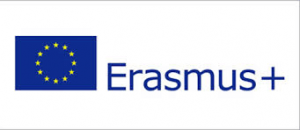
ERASMUS + – NITOK PROJECT
On October 4-9, students of our school will take part in the NITOK project of the Erasmus + program. NITOK stands for: National Identity and Tolerance in Olofstrom and Krakow. The main topics of the project will be broadly understood national identity and tolerance.
During the project, students of High School No. 6 and Nordenbergsskolan from Olofstrom in Sweden will participate in trips to Wieliczka, Oświęcim, city games and visits to the museum. Swedes will get to know Polish culture and history, and Poles in April will have the opportunity to learn about the culture of Sweden. All this in order to answer questions during the project – who we are, how tolerance or the lack of it can affect the identity of an individual and how to live in the modern world – so cosmopolitan on the one hand and full of fears and xenophobia on the other hand.
Project coordination: Anna Eastwood, Justyna Wieczorek
2014/2015 school year
April 23 – World Book and Copyright Day
World Book and Copyright Day is an annual celebration established in 1995 by UNESCO to promote reading, editing and protect intellectual property by copyright.
The idea of organizing the holiday was born in Catalonia. In 1926 his publisher, Vicente Clavel Andrés, performed with him. April 23 is there a sumptuously celebrated national holiday as the day of its patron saint – Saint George. According to a long tradition in Catalonia, women were given red roses on this day to symbolize the blood of St. George the Dragon. Over time, women began to reciprocate men with gifts in the form of books.
April 23 is also a symbolic date for world literature. On this day, in 1616, Miguel de Cervantes, William Shakespeare and Inca Garcilaso de la Vega died (the date of Shakespeare’s death is given according to the Julian calendar, and the other two according to the Gregorian calendar). The same day is also the anniversary of the birth or death of other prominent writers such as Maurice Druon, Halldór Laxness, Vladimir Nabokov, Josep Pla and Manuel Mejía Vallejo.
Currently, World Book and Copyright Day is celebrated all over the world – from New Zealand to Canada.
In our School this week we are offering students to take part in silent reading sessions during breaks. Join us in the Auditorium on Wednesday and Thursday for the breaks at 10.45, 11.45 and 12.45.
Rest in silence with the book!
In addition, you can take part in a selfie contest with your favorite book. Please send photos with a short description to the organizers: eastwood@test.centralcom.pl or magdalena.brud@gmail.co
Welcome!
A.Eastwood, M. Brud, J. Pstrąg
Remember: reading is fun !!!!
DRAW DISABILITY – DRAW THE DISABILITY
If you are interested in this global UNESCO project, please visit: http://www.globi-observatory.org/drawdisability/gallery/
In the category of works by authors aged 12-17, you will find a drawing by Karolina Biedroń from the 1H1 class. You can vote for him in July. Meanwhile – big applause for Karolina for a very suggestive illustration!
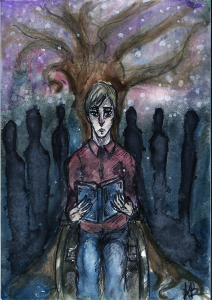
UNESCO World Poetry Day
World Poetry Day is celebrated every year on March 21. It is a holiday established by UNESCO in the fall of 1999. The aim of this day is to promote reading, writing, publishing and teaching poetry around the world. UNESCO declared that the day was to “give a new impetus to the appreciation of poetry and support national, regional and international poetry movements.”
On the occasion of the UNESCO World Poetry Day, first-grade students discussed a contemporary poem telling the story of an emigrant – Island Man by Grace Nichols, during English lessons. The task summarizing the poetry lessons was to write a poem about the same man, but in a new situation, using the original and his title as inspiration. Great poems were created. Congratulations to the young VILO poets !!!
‘Island man’
by Grace Nichols
Morning
and island man wakes up
to the sound of blue surf
in his head
the steady breaking and wombing
wild seabirds
and fishermen pushing out to sea
the sun surfacing defiantly
from the east
of his small emerald island
he always comes back groggily groggily
Comes back to sands
of a grey metallic soar
to surge of wheels
to dull North Circular roar
muffling muffling
his crumpled pillow waves
island man heaves himself
Another London day
A oto kilka wierszy naszych uczniów:
In the funny world
Surrounded by the work
Living in this way
And doing nothing wrong
Never ending circle
Dummy waiting for
Miracle letting go
Away so far that
No one’s ever thought
———————
I am
Sad
Lonely
Alien
Naked
Dumb
Me
A
New man in London
———————–
I’m depressed. It’s
Such a long day.
Lonely as always
And can’t find the way.
Now I am dreaming
Dreaming ’bout islands
Miserable Living
Alone in the silence.
Neurotic insomniac night.
————————
Irritating, frustrating…
So many feelings burning in his head
Love and hate
Another cloudy day
Nobody knows how big his pain is
Death is the only way…
Maybe he should leave his memories
And live ‘around’ Gray Street
Now it’s time to sleep…. Goodbye.
——————
Island man
Silly man
Leaving his life as he can
Arriving at his home
Never being alone
Dreaming of country because he likes
Mining
Asking himself who he became
No one came
————-
Island is a beautiful place with
Sand all over it.
London is the opposite
All days here are the same
Noisy city, rude people
Dull Oxford Street roar
Morning
Another busy day
Nothing will change today
RESULTS OF THE TRANSLATION COMPETITION BETWEEN WORDS
We are pleased to announce that the winners of the competition for the best literary translation are:
in the POETRY category – Katarzyna Jaszczyszyn from class 1e,
and in the PROZA category – Luiza Rach from class 2a2.
Congratulations to both winners!
We would also like to thank everyone taking part in the competition for their time and effort put into your translations. All the works were very interesting and choosing the best ones was really difficult.
The awards in the competition were funded by the Parents’ Council of Secondary School No. 6.
Organizers: prof. Iwona Ryż and prof. Jakub Pstrąg
GLOBAL CAMPAIGN – DRAW DISABILITY
We invite you to participate in a global art campaign to raise awareness about disability. If you can draw, the fate of people with disabilities is close to you and you would like to do something to draw attention to their everyday struggles, take part in this global action by the United Nations.
If you have questions, more information is provided by prof. Anna Eastwood.
Welcome !!!
More details can be found in the attachment.
BETWEEN WORDS – TRANSLATOR COMPETITION
We invite you to participate in the competition for the best translation
prose and / or poetry !!!
We encourage all those who wish to deal with the difficult matter of Polish and English to translate a poem and / or a prose fragment from Shakespeare and Harry Potter into the language of Mickiewicz and The Witcher. Of course, bilingual prizes await the authors of the most interesting and, at the same time, the most faithful translations!
1. Kategoria PROZA: fragment opowiadania Kazuo Ishiguro „A Family Supper” od początku do zdania: „The daylight had al most gone.”, tekst znajdziecie tutaj: http://www.google.pl/url?sa=t&rct=j&q=&esrc=s&source=web&cd=1&sqi=2&ved=0CCAQFjAA&url=http%3A%2F%2Fseas3.elte.hu%2Fcoursematerial%2FHarasztosAgnes%2FIshiguro%2C_A_Family_Supper.rtf&ei=g_3RVJbNH46s7Aaa7YCYDg&usg=AFQjCNEJRUV2MH_YxAPclXzuVH46bFqpAA&bvm=bv.85076809,d.bGQ
2. Kategoria POEZJA: wiersz E. E. Cummings’a „[i carry your heart with me(i carry it in]”, tekst znajdziecie tu: http://www.poetryfoundation.org/poetrymagazine/poem/179622
We are waiting for your printed translations until March 5, 2015.
Organizers: prof. Iwona Ryż and prof. Jakub Pstrąg.
ZAPRASZAMY!
|
|
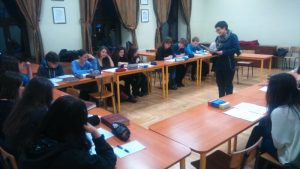 |
Translation workshop – 21/01/2015
Saved in translation
On January 21, 2015, the participants of the TRANSLATOLOGY WORKSHOPS, which took place at our school, will surely be remembered for a long time. The participants of the classes with Dr. Agata Hołobut, associated with the UNESCO Chair for Translation Research and Intercultural Communication of the Jagiellonian University, attempted to translate into Polish the short story by Jhump Lahiri entitled A Temporary Matter.
The Anglo-Polish skirmishes turned out to be an extraordinary experience. The workshop leader impressed everyone with her competence and smile. VILO students, in turn, showed incredible creativity. Working together on the final Polish version of the original allowed young translators to learn the secrets of this difficult work. The classes made us all aware that the (extremely time-consuming!) Task of a literary translator is not only to translate a text from one language to another, but above all to try to convey the color, atmosphere and context that characterize the original.
We invite all willing translators to take part in the competition, the details of which you will learn soon. You’re welcome!
Organizers: Iwona Ryż, MA and Jakub Pstrąg, Ph.D.
TRANSLATION WORKSHOPS – TRANSLATION PROSE
All students who have applied for the PROSE IN TRANSLATION translation workshop are asked to translate a fragment (to the words “part of her body.”) Of the story A Temporary Matter by Jhump Lahiri, and bring their work to class.
You can find the text here:
http://faculty.ucc.edu/english-chewning/A%20Temporary%20Matter.pdf
We would like to remind you that the workshops will be held on January 20, from 4:00 p.m. to 5:30 p.m., in the building of the VI Secondary School, and will be led by an academic teacher associated with the UNESCO Chair for Translation Research and Intercultural Communication of the Jagiellonian University, Dr. Agata Hołobut.
Happy work!
Between words – translation workshops.
On November 26, students of bilingual classes 1A1 and 2A2, together with their tutors, Mrs. Iwona Ryż and Mrs. Magdalena Brud, took part in the POETRY IN TRANSLATION workshop addressed to high school students, organized by the UNESCO Chair for Translation Research and Intercultural Communication of the Jagiellonian University.
During this short, but very fruitful (sic!) Meeting, led by Dr. Agata Hołobut, young translators took to translating the excellent poems of the contemporary Welsh poet, Gwyneth Lewis. Working under the supervision of a professional was pure intellectual pleasure for young translators.
The classes were so interesting that we decided to invite Mrs. Doctor to the walls of our school, this time to the PROZA IN TRANSLATION workshop. The meeting will be held on January 20 at 4:00 p.m. in High School No. 6. All those willing to face the literature in English are asked to report their participation to Mr. Iwona Ryż and Mr. Jakub Pstrąg (filolog@autograf.pl)
Welcome!
|
|
 |
A city game on the occasion of the 11th European Day of Foreign Languages – 30/09/2014.
On September 30, 2014, on the occasion of the European Day of Foreign Languages, second-grade students took part in a city game that took place in Kazimierz, Krakow. The monuments of this district of Krakow have been inscribed on the UNESCO World Heritage List since 1978, and since 1994 Kazimierz has been considered a historical monument.
During the game, which was held in English, students in groups solved puzzles, answered questions related to the monuments of Kazimierz, as well as recorded a film, talked about intercultural communication and … wrote poems!
Would you know the answers to some of the following questions? Test your knowledge about Kazimierz!
|
What did Schindler’s factory use to make? What are the current exhibitions at the Ethno-museum ? How many synagogues, churches and mosques are there in Kazimierz? Where did VI LO use to be located before it moved to Narrow Street? |
We thank all students for their active participation and congratulations on their creativity!
Here are the poems that were created during the city game:
When you ride on the tram
You don’t stand in the traffic jam
You just go through the street
And the life seems to be sweet
But if you don’t buy a ticket, you will run.
Our trams are awesome and blue
That’s why you should love them too
They are always late and crowded
It is also hot inside it.
Public transport in Krakow city
Is a mess, which is a pity.
The blue buses and blue trams
There we can’t play drums
There are a lot of people inside
So we want to look outside
Thank you for our journey.
Roses are red violets are blue
Trams are late and so are you
Always late, never on time
Not even worth
Spending a dime.
If you have a bad day
You are gonna pray
You can run away
Better find your way
If they catch you
They will say that you have to pay.
It’s communication day!
If you travel by tram
You won’t get stuck in a traffic jam
Be careful – they may be late
So you could miss your date
Then you need to call your mum.
There used to be a blue Cracovian tram
On which people would eat sandwiches with ham
It wouldn’t stand when people did eat
Because it didn’t like meat.
Tram station in a pretty location
But Wawrzyńca street is ugly a little bit
And the oldest tram will never come.
Public transport
is cool
because
it brings me to school
Cracow’s Public Transport is really funny
Even when day is not sunny
It always seems to be crowded
But we should be proud about it.
|
|
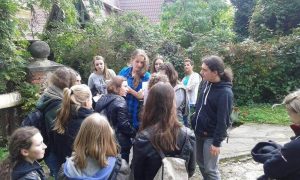 |
In the footsteps of UNESCO World Heritage – 25/09/2014
On September 25, class 1A2 set off on a trip to Lanckorona, which is included in the UNESCO World Heritage List.
Students took part in a city game, the route of which led along the picturesque streets of Lanckorona to the castle hill, where a picnic with a bonfire took place. Admiring the nineteenth-century houses and the charming Market Square (considered by many to be the most beautiful in Poland), we admired the surroundings and the atmosphere of this unique town.
(United Nations Educational, Scientific and Cultural Organization) was established on November 16, 1945, by virtue of the signed Constitutional Act, in the preamble to which we read that because wars are born in people’s minds, they should also be fought in their minds. At the end of World War II, this statement came as no surprise. The experiences of totalitarianism have changed the attitude of states to the issue of war and peace – including those that not so long ago believed that only the principle of maintaining the status quo guarantees maintaining stability and development in the world. For the generation brought up in the first half of the 20th century, it became obvious that totalitarian ideology and populism were a threat to peace. A vision of a world based on international cooperation has become a counterweight to the world held hostage by the balance of power.
UNESCO is a multilateral organization that coordinates activities aimed at the development of international cultural, educational and scientific cooperation. By creating standards of cooperation by establishing international law in the above-mentioned areas and mobilizing the international community for joint actions, it implements the objectives of the policy that we would today call public diplomacy. On the assumption that peace is not only a state of non-war, the Organization actively strives to develop a culture of peace in the world. This requires the involvement of states, the cooperation of various institutions and the implementation of programs, but above all, the involvement of people who are free from prejudices, willingness to pay back and are not caused by fear, but by interpersonal solidarity. Assuming also that peace is a choice that respects difference and is not possible without dialogue, UNESCO has become a promoter of dialogue between nations and civilizations. The organization supports the exchange of experiences aimed at sustainable development, based on the assumption that future generations will be able to benefit from the heritage shared by modern people.



